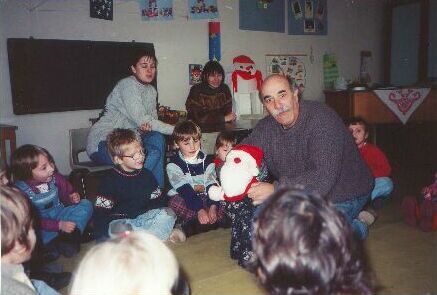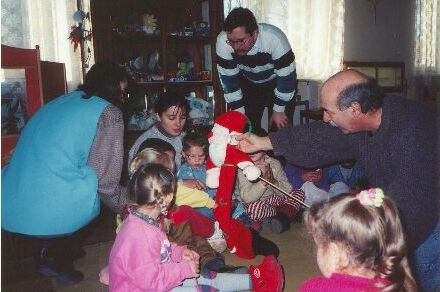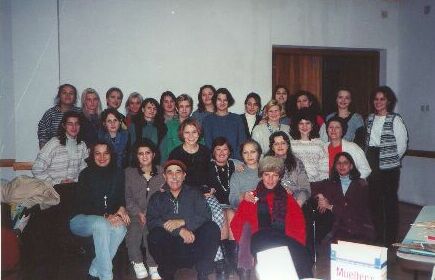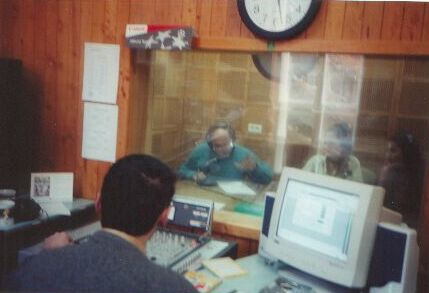
 Children are the same
everywhere; they need to
play. Romanian kids do too. However, like all children living in stressful
environments, These children need some additional support in
order to preserve their sense of well being and most importantly their
belief in a satisfactory future. The Puppet Therapy Institute (NP), a not
for profit organization that Dr. Palumbo founded, has provided play
material, supplies and staff training to professionals working with
children who have special needs.
Children are the same
everywhere; they need to
play. Romanian kids do too. However, like all children living in stressful
environments, These children need some additional support in
order to preserve their sense of well being and most importantly their
belief in a satisfactory future. The Puppet Therapy Institute (NP), a not
for profit organization that Dr. Palumbo founded, has provided play
material, supplies and staff training to professionals working with
children who have special needs.
Our trip this year was particularly successful.
As usual we were met at the Otopeini Airport in Bucharest by our friends
who had made the long trip over the mountains from Brasov. Luckily this
year we were treated to warm weather and clear skies, a welcome contrast
to our last trip when we traveled through the mountains in the night
during their worst storm in
50 years.
It is a rare pleasure to be able to again meet far-away friends; the reunions seem to create a continuity and a flow to life; and when you again meet friends from another culture, some how the world gets smaller and all of it the same. Being human becomes a simple fact. We were excited about our joint service venture and talked away the long ride back to Brasov. In a strange way, we felt at home.
As usual, we had a dozen boxes of supplies for the teachers and children helped through the Pro Educatione organization that Marianne Lenghel had founded. This year we focused our aide on needed play supplies for children attending a special school. We boxed up personal and group play toys, gym and playground supplies and several boxes of teaching supplies. Everybody enjoys spending an evening opening up the boxes that Lufthansa helps transport through an additional baggage allowance for non-profits.
Our training project this year was to help teachers learn to construct small puppet stages that were designed by Dr. Palumbo, The teachers could then use these inexpensive educational tools to help children with brief attention spans, impulsiveness and hyperactivity learn to focus their attention and develop their imagination. These teaching tools can be made from very cheap materials and consequently we were able to supply over twenty classrooms with them and related play materials.
Like all professionals, the Romanian teachers
soon passed news about our projects to others and through the informal,
face-to-face information system, we found ourselves beginning a Play-Care‘
project at the Brasov Childrenís Hospital. After much negotiation and
planning, we were allowed to visit the hospital and work with the
Child-life staff. The hospital was a short taxi ride from the apartment we were living
in, but in the small car it was a squashed ride with the three of us, the
puppets and supplies we had brought. But we managed and that was the joy
in it.
short taxi ride from the apartment we were living
in, but in the small car it was a squashed ride with the three of us, the
puppets and supplies we had brought. But we managed and that was the joy
in it.
The Child-life staff loved playing with the large puppets we had brought them, especially one child who had been in care for several years. The staff told us that for the past several years, more abandoned ill children were placed at their door. They hoped the problem would improve because they were not able adequately care for them. Fortunately, our small contribution was immediately useful.
We were also able to provide a computer printer and some associated soft- ware; this meant that the staff could generate more of their own therapeutic play material and provide computer games for the children.
Mrs. Palumbo, RN, gave nursing lectures to
students at the school affiliated with the childrenís hospital. Each
year she presents information and training that is related to an
international health problem like AIDS. And now that some professionals
have at least limited access to E-Mail, she is able to maintain contact with interested students.
maintain contact with interested students.
And just when we thought that our project was finished, an amazing event occurred. We were bumping around the buildings of the University of Transylvania looking for an art
department. We had hopes of finding young Romanian artists and graphic designers to create art work for the adapted play toys that Dr. Palumbo has created; however we literally stumbled into the offices of Romanian National Radio; they had been open only one month! Dr. Silly“ went right to work.After explaining that I also create my own radio program for children and after sharing our immediate enthusiasm for the media, we planned a mutual project. The next day, I found myself not only being interviewed for national radio, but further flattered that they hoped I would read one of my Christmas stories on the air. They would preface the program with translated key words for the listeners and then follow with the Dr. Silly“ original story, "Lothar the Reindeer Bandit."
The project was a perfect success.
After these initial radio broadcasts, we were
able to record a Christmas play prepared for Dr. Silly“
by the children from the Brasov
Everybody benefited. Now, additional radio broadcasts are planned, using Dr. Silly“ stories as a means to promote learning English and international cultural exchange.
Our service commitment to Romanian children had immediately deepened.
